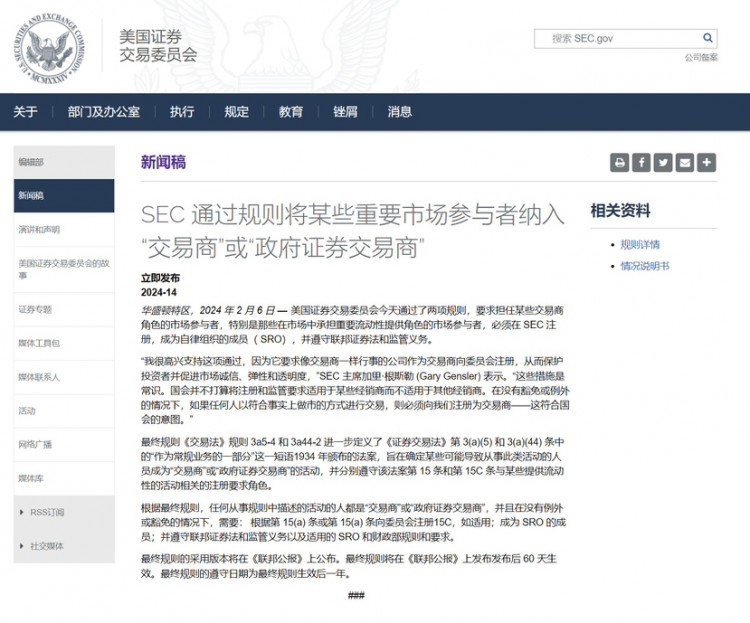Time:2024-02-07 Click:156
It seems that not many people in the Chinese field are paying attention to the information released by the SEC today, but it may be a very, very important thing, so important that it may change the landscape of DeFi.
Some friends may question whether it is that exaggerated. You can first read the new rules, which require:
“Market participants who serve in certain dealer roles, particularly those with significant liquidity provision roles in the market, must register with the SEC, become members of a self-regulatory organization (SRO), and comply with federal securities laws and regulations obligation."
Can you understand what this means? In theory, this is a requirement for market makers, who must register with the SEC and:
"Any person who engages in activities described in the rules is a "dealer" or "dealer in government securities" and, without an exception or exemption, is required to: Pursuant to Section 15(a) or Section 15(a) Register with the Commission under 15C, if applicable; become a member of the SRO; and comply with federal securities laws and regulatory obligations and applicable SRO and Treasury rules and requirements.”
In other words, this requires SEC approval and relevant qualifications before you can engage in the role of "market maker". Many friends may still not understand this. This is just a requirement to be a market maker. What does it have to do with DeFi? ?
This is the biggest problem. There is a role in DeFi called "AMM", and the people who make up this role are called "LP". Do you understand now that the LP that provides liquidity to DeFi, that is, the one that provides liquidity to AMM, is also called Market makers, and in fact the services provided are indeed the services of market makers.
So it is not ambiguous whether AMM is what the SEC calls "market participants who play certain dealer roles, especially those who play an important role in providing liquidity in the market." As a result, let me give you an example.
Assume that project party A issues a coin and then sets up a trading pair on DEX, and the largest liquidity provider in this trading pair is the project party, then project party A complies with SEC regulations, because project A becomes "Dealers".
Of course, if the overall liquidity of A, including the currency price, is very limited, then even if it violates SEC regulations, I believe no one will come to trouble you. But if you replace A with a top-level project, and this top-level project It has attracted a large number of users and funds, and the project party or a certain person has become the largest liquidity provider, so do you think the SEC will take action? Even if you don’t do it directly, if you match the SEC’s verbal language
"You are a security", what will happen?
Yes, you might say, this is just code, this is decentralized. This is true, but what provides "liquidity" to the code must be a centralized "entity" that owns assets. Of course, you have to say that this is the liquidity pool of the AI group, which is not impossible. Then it depends on the ultimate beneficiary of AI. Who it is, if it is a black hole, then of course it doesn't matter, but if it is an individual entity, this new regulation still applies.
Of course, we don’t know yet whether this regulation will really be extended to the field of Crypto, but what we do know is that this regulation 100% covers the field of Crypto. It just depends on how the SEC will choose to implement it. That's all.
PS: So what are the disadvantages of this provision? Do you even need to ask? The SEC will not easily attack an individual. The cost of enforcement is too high and the benefits are too low. Moreover, the individual himself will not have much influence on a certain project. However, if he is within the jurisdiction of the SEC's "securities" , then the possibility of receiving a subpoena from the SEC will be very high. To put it bluntly, if you or your project are not on the SEC’s list or sight, then it means that 100% of the pool is yours. But if you or your project The project is being "monitored" by the SEC, so your risk is high.
To give another example, the last time the SEC announced that several tokens were "securities," and you, the lucky one, were one of the largest liquidity providers identified as "securities" tokens, then who else would be unlucky if you were not unlucky.
The "you" here may be the project party, the market maker, or even a large banker. The key point lies in "market participants who play an important role in providing liquidity."
A little more troublesome. If the AMM of your LP provides services to U.S. investors, then the SEC has direct jurisdiction and processing power. If the Token is banned from trading by the U.S. government, then "you" may be in greater trouble. Even if you are just a liquidity provider for "Pixiu" currency, as long as an American sues you...